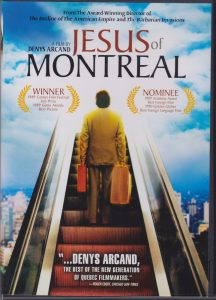Jesus of Montreal (1989) on DVD. French with English subtitles. (Adults only)
Earnest young actor Daniel Coulombe is offered a chance by an older priest to revitalize an annual Passion Play with stations, performed at a Catholic church on Mount Royal in Montreal. Casting himself as Jesus, he recruits Constance, a soup-kitchen server; Martin, an actor he finds voice-dubbing for porn films; Mireille, a sexy ads actress who’s been told she can’t act; and Rene, a documentary voice-over actor who wants most to perform Hamlet’s ‘To be or not to be”. This is the cast who ends up playing multiple roles in a modern retelling of the Crucifixion and Resurrection using sites on Mount Royal.
The movie quickly and abruptly segues from casual realistic, cobbled-together rehearsals into very sincere, serious, graphic scenes of the actual finished play in its first powerful performance. Particularly unexpectedly strong scenes like Jesus breaking bread with the audience, His walking on water, being whipped and stabbed on the cross, and His being raised from the dead have a verisimilitude that convince many of the audience what they are witnessing is real and that Daniel is a great actor and actually Christ-like. (Even Rene gets his wish to perform “To be or not to be” set appropriately against the Christ narrative. The extras also dispense Christian life-wisdom in the Resurrection scene climax.)
Director-writer Deny Arcand’s masterpiece is beautifully photographed on Mont Royal and includes Montreal skyscrapers, hospitals, film studios, and even the subway. This creates a pointed larger modernistic, juxtaposed context for the telling of Daniel’s story, especially after the midway point when the hypocritical, conflicted, sold-out priest informs the troupe that the Church wants to shut the play down before a second performance. As he says, “Institutions live longer than individuals.”
The secular-religious plot moves into high gear for further social commentary by developing absurdist satire of exploitive advertising and the ‘star-making’ machine through scenes in which Daniel rescues Mireille in a parody of the money-lenders temple scene and in which he is tempted by an incredibly slick entertainer promoter-lawyer in a skyscraper parodying Christ’s temptation by the Devil. The climactic arrest of Jesus scene that follows is clever and rife with irony as is the “Last Supper’ pizza scene on the mount.
Suffice to say, that Arcand continues to throw huge, ironic twists and curves from this point on to the end to the picture and the end of Daniel’s metaphorical journey. What can go wrong does go wrong with believable failures and abject suffering in public places. As Rene correctly predicted, “Doing tragedy is dangerous.” The long surprise-ending rolls out poetically, ironically, realistically, and absurdly.
But there is a logic and many truths to all that Daniel experiences and the viewer, much like the audience at the play, witnesses. And Arcand leaves the viewer wondering, like the priest: What is more important? Honesty, truth-telling, and realism, or fiction, pleasure, and happiness in this too-oft brief and harsh modern existence?
Highly recommended for viewers who enjoy clever satire, symbolism, highly-engaging, and thought-provoking cinema. A perfect film requiring no edits.

